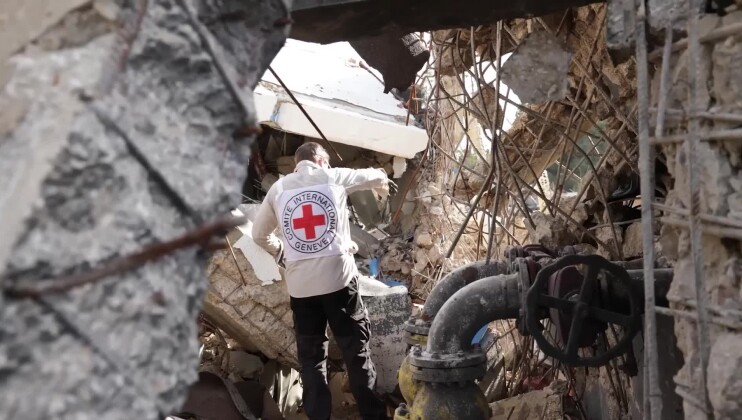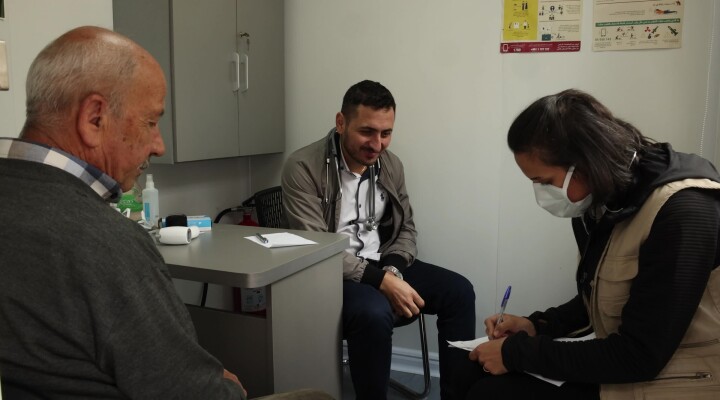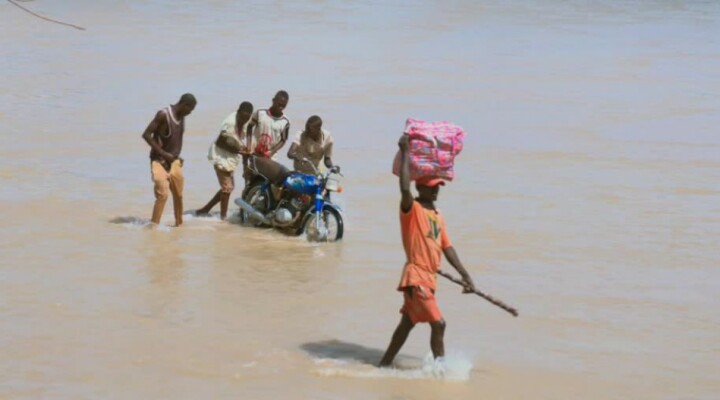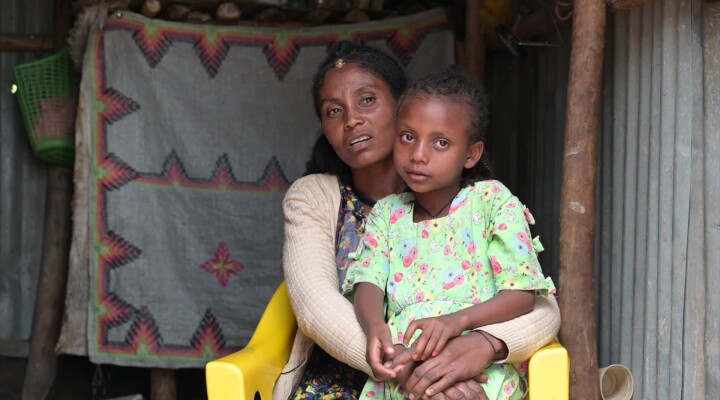Lake Chad: ICRC President calls for world to urgently address
A protracted conflict in the Lake Chad region has spread across four countries: Nigeria, Niger, Chad and Cameroon. Over nine million people need urgent humanitarian assistance. 2.6 million have been displaced, some of them multiple times.
In Nigeria’s Borno State alone hundreds of thousands of people fleeing violence have overwhelmed host communities. In some parts of Borno, the armed conflict has made delivering aid extremely difficult. Malnutrition, exhaustion, diarrhea, cholera and measles are causing a high death rate.
The ICRC and the Nigerian Red Cross Society have managed to gain access to previously inaccessible areas of Borno state, and are working to support families in need.
“Our local problem is food and medical treatment” says Ekita Bulama, a Sabon Gari resident who has recently returned to Borno after fleeing the conflict in 2013.
Children are among the most affected by this humanitarian crisis: they face severe malnutrition because their families cannot access food and other vital health services.
The ICRC has set up a nutrition centre to treat the most critical cases.
“In my 35 years of experience, I have never seen such cases,” says Patrick Misheria, the ICRC Head Nurse at the centre. “Some of the cases I had seen in pictures but this time I saw in reality.”
The nutrition centre in Sabon Gari is one of 16 centres for primary health care set up by the ICRC. Since January 2016, more than 300,000 patients have been treated. The desperate humanitarian conditions mean patients are often facing multiple health problems, such as infections. The medical teams must first focus on stabilizing patients before they can begin to reverse the effects of severe malnutrition.
Across the Lake Chad region, the conflict is causing huge upheaval. The population of one affected village, Garin Wanzam in the Diffa region of Niger, has swollen from 1500 original inhabitants, to over 30,000. The newcomers arrived in the space of just 72 hours in June, fleeing conflict to a place they hoped would be safe.
“This is, despite the fact that it is one of the largest operations of the ICRC in the world, a forgotten crisis,” said ICRC President Peter Maurer, who visited Garin Wanzam this week. “Where people outside of Niger, outside of the Lake Chad region do not really offer the attention which this conflict deserves.”
For a small village like Garin Wanzam, feeding so many new mouths is a huge challenge. Water too is precious, the village has just one well. The ICRC is supporting Garin Wanzam with food supplies, and with water, this aid will save lives, but the people affected by this crisis deserve, Mr Maurer says, much more.
“Children, who have seen outrages, violence, who have seen displacement,” he said, “and who keep the hope alive that there is something better in life than what they see at the present moment.”
“And then on the other hand,” Mr Maurer continued, “I see nevertheless people who have been heavily affected in their lives, older people, who have seen it all, and who are full of resignation and introspection and who almost do not seem anymore to realize what is going on around them.”
For the millions of people, young and old, caught up in the Lake Chad Region conflict, aid can be a huge help – in the short term. But humanitarian relief can never be a long term solution. This crisis is now in its sixth year, it needs international attention, and political will, to give hope back to people, and to allow them to return home, and restart their lives in peace.
Facts and Figures:
- Over 9 million people are currently in urgent need of aid in the Lake Chad region because of six years of conflict between government forces and armed opposition.
- Since the beginning of the year, the ICRC and the Nigerian Red Cross Society have distributed food to more than 900,000 displaced people and returnees in Nigeria, while 28,300 displaced people have received emergency shelter in Adamawa and Borno States in Nigeria.
- Since the beginning of the year, in Niger, the ICRC and the Niger Red Cross have distributed 9000 tons of food to 310,000 displaced people and returneesand 4,100 kits containing essential household items.
Shotlist
Location: Borno State Nigeria, Diffa Province Niger
Length: 3:22
Format: HD H264 MP4
Camera: MarkKamau, Mouhamadou Birom Seck, Kathryn Cook-Pellegrin
Sound: English
Diffa, Niger
0:00 - 0:05 MS displaced women sitting
0:00 - 0:09 WS displaced people
0:09 – 0:10 MCU women and children
0:19 – 0:21 MCU small girl alone
0:21 – 0:24 MS old man
0:24 – 0:26 MS three young men
Sabon Gari, Nigeria
0:26 – 0:30 WS village street
0:30 – 0:33 WS IDP houses
0:33 – 0:36 WS IDP families outside house
0:36 – 0:46 MCU tilt up malnourished child
0:46 – 0: 55 Interview Clip, Ekita Bulami, Sabon Gari resident
‘Our local problem is food, food and medical treatment. (internal edit at 0:51) If not because of the red cross we cannot even live.’
0:55 – 1:00 MWS exterior hospital
1:00 – 1:08 Child being checked
1:08 – 1:11 Another child
1:11 – 1:29 Interview clip Patrick Misheria, ICRC nurse
‘In my 35 years of experience I have never seen such cases. Some of the cases I had seen in pictures but this time I saw in reality.’
1:29 – 1:34 Exterior nutrition centre
1:34 – 1:41 Mother and child being treated
1:41 – 1:43 Mother with two children
1:43 – 1:53 Close up small girl playing
Diffa, Niger
1:53 – 2:00 WS displaced seated on ground
2:00 – 2:04 pan across displaced from low angle
2:04 – 2:08 tilt up displaced
2:08 – 2:14 WS displaced women approach for food distribution
2:14 – 2:20 MWS women in lines for food distribution
2:20 – 2:42 Interview clip Peter Maurer, ICRC President
‘This is, despite the fact that it is one of the largest operations of the ICRC in the world, a forgotten crisis. Where people outside of Niger, outside of the Lake Chad region do not really offer the attention which this conflict deserves and which the people deserve.’
2:42 – 2:46 MS registration for food
2:46 – 2:53 MCU women in colourful dress waiting
2:53 – 3:00 WS Food and water supplies arriving
3:00 – 3:04 ICRC vehicle, POV driver arriving camp
3:04 – 3:11 Peter Maurer arriving, walking through camp
3:11 – 3:16 Peter Maurer with displaced, mainly children, to water pump
3:16 – 3:19 MCU Water pump
3:19 – 3:55 Interview clip Peter Maurer, ICRC President
‘Children, who have seen outrages, violence, who have seen displacement,” he said, “and who keep the hope alive that there is something better in life than what they see at the present moment. And then on the other hand,” Mr Maurer continued, “I see nevertheless people who have been heavily affected in their lives, older people, who have seen it all, and who are full of resignation and introspection and who almost do not seem anymore to realize what is going on around them.’
3:55 – 4:03 Peter Maurer sitting talking to adult displaced.
4:03 – 4:15 MS displaced carrying food sacks on head
Sabon Gari, Nigeria
4:15 – 4:18 MCU food sacks loaded into hand carts
4:18 – 4:24 WS food and hand carts
4:24 – 4:31 Tracking man and boy pushing hand cart into village



